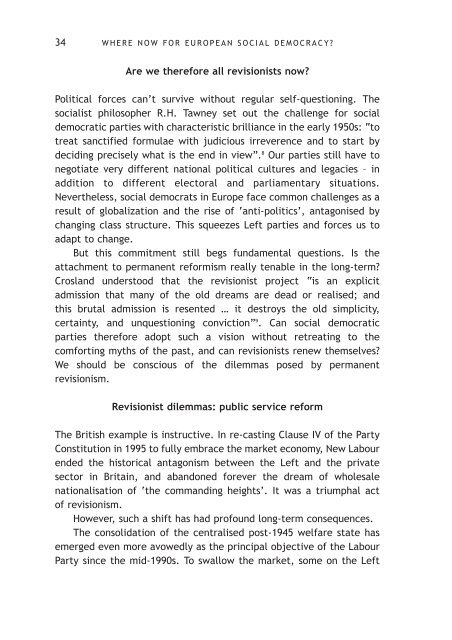Where Now for European Social Democracy? - Policy Network
Where Now for European Social Democracy? - Policy Network
Where Now for European Social Democracy? - Policy Network
Create successful ePaper yourself
Turn your PDF publications into a flip-book with our unique Google optimized e-Paper software.
34WHERE NOW FOR EUROPEAN SOCIAL DEMOCRACY?Are we there<strong>for</strong>e all revisionists now?Political <strong>for</strong>ces can’t survive without regular self-questioning. Thesocialist philosopher R.H. Tawney set out the challenge <strong>for</strong> socialdemocratic parties with characteristic brilliance in the early 1950s: “totreat sanctified <strong>for</strong>mulae with judicious irreverence and to start bydeciding precisely what is the end in view”. 8 Our parties still have tonegotiate very different national political cultures and legacies – inaddition to different electoral and parliamentary situations.Nevertheless, social democrats in Europe face common challenges as aresult of globalization and the rise of ‘anti-politics’, antagonised bychanging class structure. This squeezes Left parties and <strong>for</strong>ces us toadapt to change.But this commitment still begs fundamental questions. Is theattachment to permanent re<strong>for</strong>mism really tenable in the long-term?Crosland understood that the revisionist project “is an explicitadmission that many of the old dreams are dead or realised; andthis brutal admission is resented … it destroys the old simplicity,certainty, and unquestioning conviction” 9 . Can social democraticparties there<strong>for</strong>e adopt such a vision without retreating to thecom<strong>for</strong>ting myths of the past, and can revisionists renew themselves?We should be conscious of the dilemmas posed by permanentrevisionism.Revisionist dilemmas: public service re<strong>for</strong>mThe British example is instructive. In re-casting Clause IV of the PartyConstitution in 1995 to fully embrace the market economy, New Labourended the historical antagonism between the Left and the privatesector in Britain, and abandoned <strong>for</strong>ever the dream of wholesalenationalisation of ‘the commanding heights’. It was a triumphal actof revisionism.However, such a shift has had profound long-term consequences.The consolidation of the centralised post-1945 welfare state hasemerged even more avowedly as the principal objective of the LabourParty since the mid-1990s. To swallow the market, some on the Left



